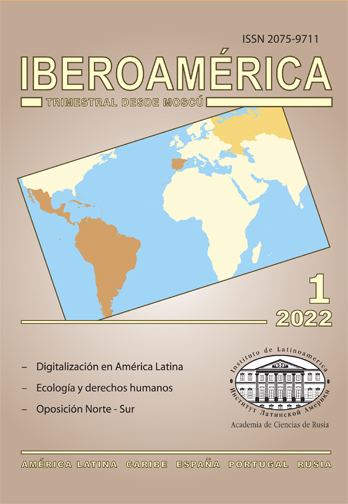
This issue is divided into three sections. The first is devoted to economics and finance. It opens with an article by Razumovsky D.V., which examines the dynamics of the processes of introduction of digital technologies into economy and social life of Latin American countries. Despite the success in developing some elements of digital infrastructure and ensuring the expanding coverage of population with broadband service access through mobile or fixed connection, most of the states of the LAC region remain completely dependent on the technological leaders. In the following article, Colombian scholars Maria Camila Bermeo Giraldo, Alejandro Valencia Arias, and Orfa Nidia Patiño Toro analyze the factors associated with millennials’ (the generation of the 2000s) investments into cryptocurrencies. The study was conducted on the basis of 136 opinion polls and completed as a part of a factor analysis with a quantitative approach and investigative as well as descriptive coverage. The results of the study confirmed the fact that the proposed model is able to explain the intentions of the millennials to invest into cryptocurrencies. The article by Yakovlev P.P. considers the position of Latin America and Russia in the global food market. The author notes that the global economic crisis caused by the COVID-19 pandemic has virtually not affected the interests of manufacturing companies and exporters of food products. In this regard, the current situation not only favors the further growth of companies producing agricultural products in Latin America and Russia, but also changes the context of trade and economical relations between Russia and Latin America.
The second section, devoted to ecological problems, begins with an article by Semenov V.L., which analyzes the most important aspects of the development of alternative energy in the countries of the LAC region and compares the current situation in the promotion of renewable energy sources (RES) and in the production of “green” hydrogen in the named region and in Russia. The author comes to the conclusion that the progress in the development of alternative energy depends on natural, macroeconomic and political prerequisites and is impossible without the implementation by the leaders of countries of a long-term policy that would stimulate the introduction of modern technologies and equipment. The authors of the following article, Daniel Rivas-Ramírez and Edgar Hernán Fuentes, investigate the relationship between environmental issues and human rights in Brazil and Colombia. They consider the main features of Latin American constitutionalism related to environmental issues, as well as specifically Brazilian and Colombian features.
The last section refers to the confrontation between “North” and “South”. The first article is devoted to understanding the “left turn” phenomenon in Latin America. Its author Rozental D.M. emphasizes a distinctive feature of this phenomenon, namely the orientation of the governments towards achieving social equality in its broadest sense. At the same time, their stability during the period of “right-wing drift” largely depends on the established political regime. The author of the next article, Tatunts S.A., analyzes the global COVID-19 crisis in the context of the North/South dichotomy. She considers that the pandemic has changed the modern world, influenced the public opinion and caused a number of destructive processes. The article presents a cognitive model for analyzing the pandemic-related crisis in the Latin American region within the paradigm of neo-Marxism. For operational purposes, the author carries out the decomposition of the conceptual oppositions “center/periphery”, “North/South” and rethinks the features of modern international relations and the interpretation of global governance mechanisms. The article by Yakovenko I.D. provides a retrospective of the nuclear policy of Brazil in the period of 1970s-2010s taking into account the factors of the national, regional and international environment that influenced the transition of Brazil to military nuclear research and its closing up after the democratic transition of 1985. The last article in this issue is dedicated to the 40th anniversary of the war between Argentina and Great Britain over the Falkland Islands. Its author Martynov B.F. introduces his readers to the positions taken in this conflict by the Soviet Union, the United States and the Latin American countries, emphasizing that these events that took place 40 years ago may serve as a good lesson for today.
IBEROAMERICA, 2022, num. 1 (January-Mаrch)
Content
ECONOMICS AND FINANC
Petr P. Yakovlev. Latin America and Russia at the world food market
ECOLOGY
Víktor L. Semenov. Energy transition in Latin America and Russia
NORTH-SOUTH OPOSITION
Dmitry M. Rozental. Left turn in Latin America: general patterns and national characteristics
Boris F. Martynov. 40 years after the war for the Malvinas (lessons for today)














